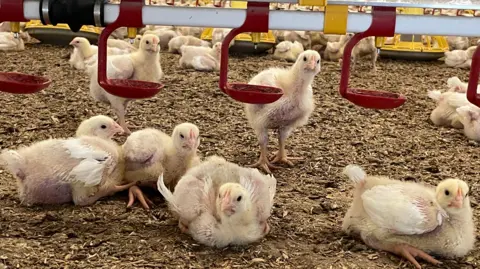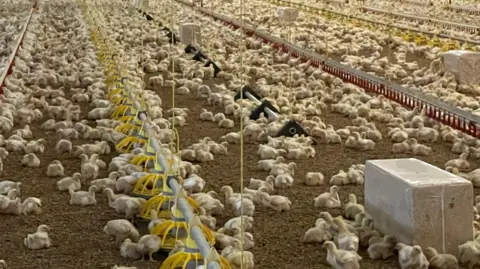Chickens get more space in sheds after Tesco pledge
 BBC
BBCOne of the UK's biggest food companies has said it's now giving chickens more room to grow, after Tesco pledged to improve welfare standards in its suppliers.
Avara processes two million chickens at its Hereford factory every week and is Herefordshire's largest private employer.
The company's supplier farms are now increasing the amount of space each chicken has in a shed and reducing the number of birds raised in a cycle.
In June, Tesco said the chickens it bought would be given 20 per-cent more space within a year. "Customers are increasingly interested in the welfare and sustainability credentials of the food they buy," said Avara chief executive Chris Hall.

"We know how much our customers care about animal welfare, and we're committed to improving standards across our ranges wherever possible," said Natalie Smith, Head of Sustainable Agriculture & Fisheries at Tesco.
Avara Foods has more than 250 farms in its supply chain, all but one are independently owned.
The company provides feed for the chickens and then culls, packs and distributes the meat.
Avara has said its supply farms will now operate at 30kg per square metre, instead of at the previous standard of 38kg per square metre.
The company said having fewer chickens on a farm should make it easier to check the health of the birds.
On average, the life of a broiler chicken in the UK, from birth to processing, is six to eight weeks.
Avara said the birds' final weights would range from 1.6kg to 2.3kg and they are weighed during the growth cycle.
More than half the meat eaten in the UK is chicken, and Avara supplies a number of supermarket and restaurant chains, including Tesco and Nando's.
The firm said it was important that food produced in the UK was valued and protected in a time of global uncertainty.
"We already import almost half of the poultry we consume," Mr Hall said.
"We have to be able to look after ourselves in an uncertain world, and food security, alongside energy and defence, is critical to that."
In 2020, TV naturalist Chris Packham and animal welfare charity Open Cages urged Tesco and Avara to improve welfare standards following undercover filming at Avara supply farms in Herefordshire and Gloucestershire.
Avara is currently facing a court challenge over claims its industrial-scale chicken farming is damaging the River Wye and the local economy.
It is estimated up to 23 million birds are being produced in the river catchment at any one time.
Solicitors Leigh Day said Avara was being sued for compensation on behalf of thousands of people living in the Wye catchment who may have been affected by pollution in the water.
Avara said all manure from its suppliers was taken away from the river and used elsewhere in the UK, and it was confident there was no case to defend.